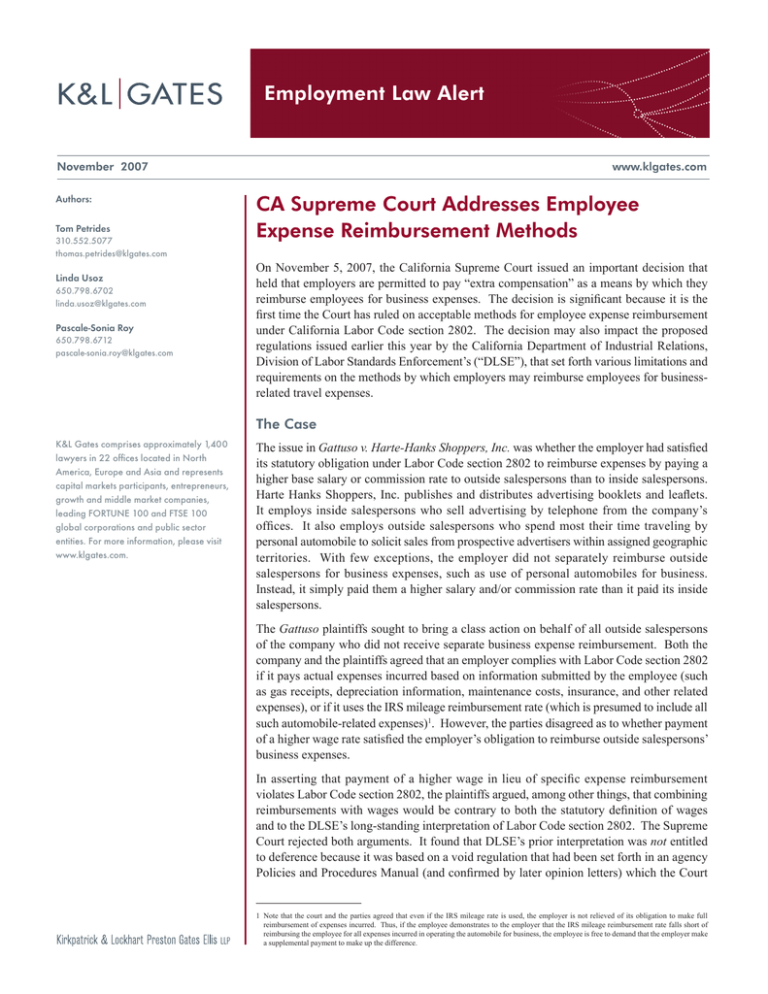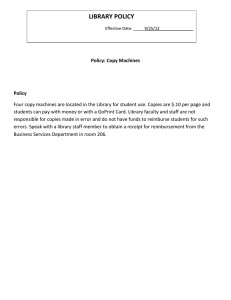
Employment Law Alert
November 2007
Authors:
Tom Petrides
310.552.5077
thomas.petrides@klgates.com
Linda Usoz
650.798.6702
linda.usoz@klgates.com
Pascale-Sonia Roy
650.798.6712
pascale-sonia.roy@klgates.com
www.klgates.com
CA Supreme Court Addresses Employee
Expense Reimbursement Methods
On November 5, 2007, the California Supreme Court issued an important decision that
held that employers are permitted to pay “extra compensation” as a means by which they
reimburse employees for business expenses. The decision is significant because it is the
first time the Court has ruled on acceptable methods for employee expense reimbursement
under California Labor Code section 2802. The decision may also impact the proposed
regulations issued earlier this year by the California Department of Industrial Relations,
Division of Labor Standards Enforcement’s (“DLSE”), that set forth various limitations and
requirements on the methods by which employers may reimburse employees for businessrelated travel expenses.
The Case
K&L Gates comprises approximately 1,400
lawyers in 22 offices located in North
America, Europe and Asia and represents
capital markets participants, entrepreneurs,
growth and middle market companies,
leading FORTUNE 100 and FTSE 100
global corporations and public sector
entities. For more information, please visit
www.klgates.com.
The issue in Gattuso v. Harte-Hanks Shoppers, Inc. was whether the employer had satisfied
its statutory obligation under Labor Code section 2802 to reimburse expenses by paying a
higher base salary or commission rate to outside salespersons than to inside salespersons.
Harte Hanks Shoppers, Inc. publishes and distributes advertising booklets and leaflets.
It employs inside salespersons who sell advertising by telephone from the company’s
offices. It also employs outside salespersons who spend most their time traveling by
personal automobile to solicit sales from prospective advertisers within assigned geographic
territories. With few exceptions, the employer did not separately reimburse outside
salespersons for business expenses, such as use of personal automobiles for business.
Instead, it simply paid them a higher salary and/or commission rate than it paid its inside
salespersons.
The Gattuso plaintiffs sought to bring a class action on behalf of all outside salespersons
of the company who did not receive separate business expense reimbursement. Both the
company and the plaintiffs agreed that an employer complies with Labor Code section 2802
if it pays actual expenses incurred based on information submitted by the employee (such
as gas receipts, depreciation information, maintenance costs, insurance, and other related
expenses), or if it uses the IRS mileage reimbursement rate (which is presumed to include all
such automobile-related expenses)1. However, the parties disagreed as to whether payment
of a higher wage rate satisfied the employer’s obligation to reimburse outside salespersons’
business expenses.
In asserting that payment of a higher wage in lieu of specific expense reimbursement
violates Labor Code section 2802, the plaintiffs argued, among other things, that combining
reimbursements with wages would be contrary to both the statutory definition of wages
and to the DLSE’s long-standing interpretation of Labor Code section 2802. The Supreme
Court rejected both arguments. It found that DLSE’s prior interpretation was not entitled
to deference because it was based on a void regulation that had been set forth in an agency
Policies and Procedures Manual (and confirmed by later opinion letters) which the Court
1 N
ote that the court and the parties agreed that even if the IRS mileage rate is used, the employer is not relieved of its obligation to make full
reimbursement of expenses incurred. Thus, if the employee demonstrates to the employer that the IRS mileage reimbursement rate falls short of
reimbursing the employee for all expenses incurred in operating the automobile for business, the employee is free to demand that the employer make
a supplemental payment to make up the difference.
Employment Law Alert
previously had determined failed to comply with the
Administrative Procedure Act in its issuance.
The Court also rejected plaintiffs’ argument that it
was improper to combine reimbursement for expenses
(which is not subject to payroll taxes and not considered
income for tax purposes) with taxable compensation
because that would contradict and confuse the
definition of “wages” under the law. It declared that
neither the language of the statute (Labor Code section
2802) nor its legislative history precluded an employer
from determining the method by which it could satisfy
its obligation to reimburse business expenses incurred
by its employees.
. . . an employer may satisfy its statutory
reimbursement obligation by paying employees
enhanced compensation in the form of increases
in base salary or increases in commission rates,
or both, provided there is a means or method
to apportion the enhanced compensation to
determine what amount is being paid for labor
performed and what amount is reimbursement
for business expenses. [2007 DJDAR 16553.]
However, the Court held that even if an employer can
meet its statutory business expense reimbursement
obligation by paying enhanced compensation, it must
nevertheless identify the portion of overall compensation
that is intended as expense reimbursement in order to
ensure that the necessary expenses are reimbursed
in full. In recognizing that such “apportionment” is
a practical necessity for effective enforcement, the
Court stated:
…Although section 2802 does not expressly
require the employer to provide an apportionment
method, it is essential that employees and
officials charged with enforcing the labor laws be
able to differentiate between wages and expense
reimbursements.
Notably, the Court specifically noted that employers
who provide business expense reimbursement
to employees through increases in base salary or
commission rates should separately identify on the
itemized wage statement pay reports required by
Labor Code section 226(a) the amounts that represent
payment for labor performed and the amounts that
represent reimbursement for business expenses. The Court further recognized that an employer who
chooses to link reimbursement of business expenses to
an increase in commission rates will run the risk that
the increased commission rate may be insufficient to
provide full reimbursement for the expenses necessarily
incurred by the employee if later challenged by the
employee.
Accordingly, while the Court held that an employer
may satisfy its statutory obligation to reimburse
employees for necessary business expenses under
Labor Code section 2802 by paying extra compensation
to the employee, employers are cautioned to carefully
apportion and document the utilized method so as to
fully comply with the requirements of section 2802.
Implication for DLSE’s Proposed
Regulations for Travel Expense
Reimbursement
Earlier this year, DLSE published proposed regulations
purporting to explain and interpret Labor Code section
2802. In its Initial Statement of the Reason for such
regulations, DLSE asserted that the regulations were
necessary to explain the statute and specify the methods
by which employers must reimburse employees for
travel expenses incurred in conducting business on
behalf of their employers. DLSE reasoned that there
was a “dearth of case law” explaining the statute and
specifying how employers can meet their obligations
under it. A public hearing on the proposed regulations
was held in February, but no further progress had been
reported by the DLSE.
The proposed regulations purport to specify and
limit the methods employers must use in determining
appropriate reimbursement rates. By way of
example, the regulations designate the IRS mileage
reimbursement rate as the only sanctioned method
of properly reimbursing employees for business use
of their personal automobile. The proposed DLSE
regulations also specify the manner in which employers
must itemize and report expense reimbursement
information at the time of payment to employees.
According to the proposed regulations, employers
must include expense reimbursement checks with
regular paychecks. The reimbursement checks must be
distributed at least monthly and must include a detailed
itemization of items being reimbursed, the amount
November 2007 | 2
Employment Law Alert
of reimbursement for each item, and any requested
reimbursements that were rejected.
The proposed regulations seemed to have stalled
following the public hearing in February. However,
in light of the Supreme Court decision in Gattuso
addressing many of these same issues, the DLSE may
be prompted to further address the proposed regulations.
The Gattuso decision noted that the DLSE has not
yet issued approved regulations relating to expense
reimbursements, but it did not hold that the DLSE
would be prohibited from doing so. Accordingly, it is
anticipated that DLSE may seek to revise its proposed
regulations to provide guidance as to what would be
appropriate apportionment methods to ensure effective
enforcement of section 2802 and consistent with the
Gattuso decision.
Conclusion
For the first time, the Supreme Court has addressed
an employer’s obligation to reimburse employees for
business expenses under Labor Code section 2802
and permitted additional methods other than what the
DLSE had previously recognized in informal opinion
letters. Employers may wish to re-evaluate their current
approach to determine whether other methods exist
which may ease the administrative burdens associated
with processing employee expense reports. While any
method chosen must fully indemnify the employee,
clearly employers now have wider discretion to choose
the method most suited to their business.
K&L Gates comprises multiple affiliated partnerships: a limited liability partnership with the full name Kirkpatrick & Lockhart Preston Gates Ellis LLP qualified
in Delaware and maintaining offices throughout the U.S., in Berlin, and in Beijing (Kirkpatrick & Lockhart Preston Gates Ellis LLP Beijing Representative
Office); a limited liability partnership (also named Kirkpatrick & Lockhart Preston Gates Ellis LLP) incorporated in England and maintaining our London
office; a Taiwan general partnership (Kirkpatrick & Lockhart Preston Gates Ellis - Taiwan Commercial Law Offices) which practices from our Taipei office;
and a Hong Kong general partnership (Kirkpatrick & Lockhart Preston Gates Ellis, Solicitors) which practices from our Hong Kong office. K&L Gates
maintains appropriate registrations in the jurisdictions in which its offices are located. A list of the partners in each entity is available for inspection at any
K&L Gates office.
This publication/newsletter is for informational purposes and does not contain or convey legal advice. The information herein should not be used or relied
upon in regard to any particular facts or circumstances without first consulting a lawyer.
Data Protection Act 1998—We may contact you from time to time with information on Kirkpatrick & Lockhart Preston Gates Ellis LLP seminars and with our
regular newsletters, which may be of interest to you. We will not provide your details to any third parties. Please e-mail london@klgates.com if you would
prefer not to receive this information.
©1996-2007 Kirkpatrick & Lockhart Preston Gates Ellis LLP. All Rights Reserved.
November 2007 | 3


